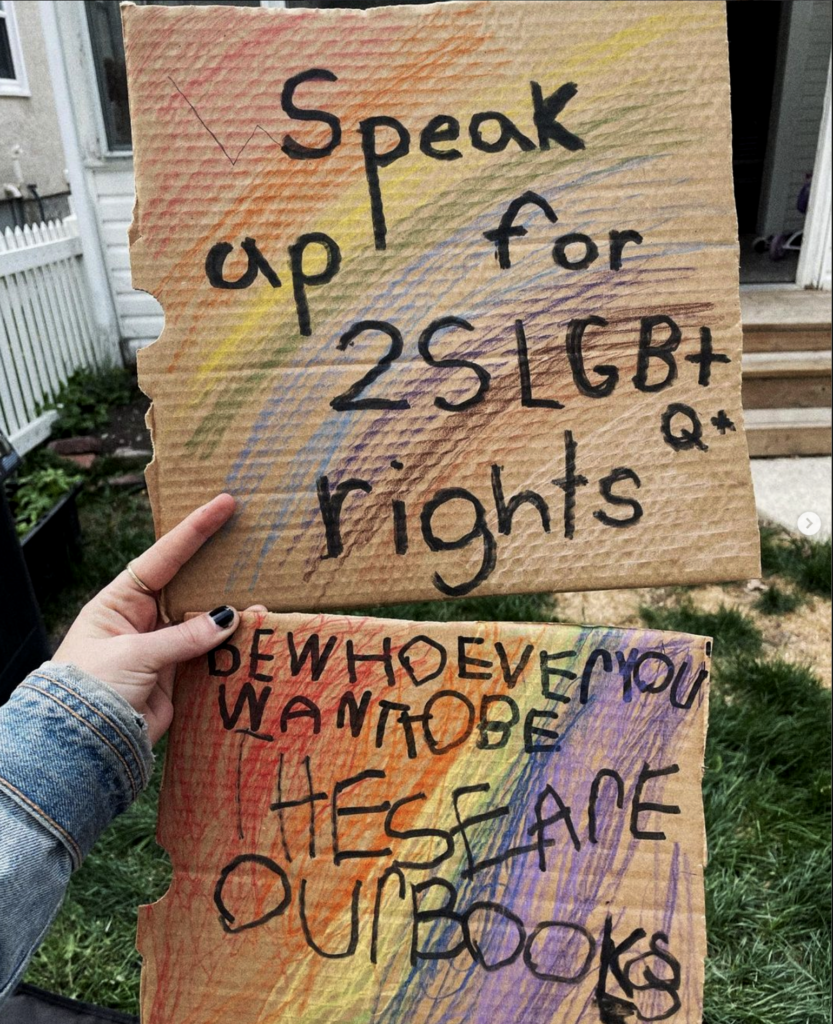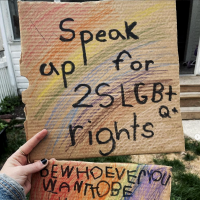Queer and sex education books for youth are still being targeted for book bans in Canada and the U.S., and communities are facing the challenges head-on.
One Canadian book banned last year was the 2014 graphic novel, This One Summer, a coming-of-age story by Mariko Tamaki and Jillian Tamaki. Challengers have called it “vulgar” and “inappropriate.” In 2016, when it was deshelved from a school in Henning, Minnesota, superintendent Jeremy Olson stated he was “not an advocate of censoring books” but he struggled to understand “if the educational need for that outweighs the vulgarity—where is that line?”
The American Library Association (ALA), which began documenting data about book challenges over 20 years ago, published a press release on Mar. 22 of this year stating that requests to ban books are the highest they have been: In 2022, ALA reported 1,269 demands to censor 2571 titles in school and public libraries, compared to 729 challenges of 1,858 titles in 2021.
“Overwhelmingly, we’re seeing these challenges come from organized censorship groups that target local library board meetings,” said Deborah Caldwell-Stone, director of ALA’s Office for Intellectual Freedom. “Their aim is to suppress the voices of those traditionally excluded from our nation’s conversations, such as people in the LGBTQIA+ community or people of color.”
These books, these flags, are only here to support who we already are.
In early May, a Winnipeg elementary school, Riverbend Community School, had its Pride flag stolen, as well as several 2SLGBTQ+ and Indigenous books from a locked classroom. Teacher Amanda Karpinsky told CBC, “It’s more than just a symbol of pride. It’s a symbol of, ‘It’s okay to be who you are.’” Following the incident, the staff and students painted pride flags and put them up around the school. “These books, these flags, are only here to support who we already are. We’re not pushing anything on anyone,” said teacher Alex Pustogorodsky.
Book ban proponents often claim that sex education kids books are explicit and encourage sexual activity, with more aggressive accusations stemming from these arguments.
The South Central Regional Library, a network of five libraries in Southern Manitoba recently refused to deshelve three sex education kids books following complaints. Library staff were accused of being “child sexual groomers” and “pedophiles” promoting pornography, and attempted to defund several libraries until they review their policies. Cathy Ching, director of library services at the South Central Regional Library told CBC that they had already reviewed their policies and there are no needs for changes.
“At their core, the challenges at the South Central Regional Library are about a much bigger issue: intellectual freedom, or the right to access information from different perspectives without being restricted,” Melanie Sucha, president of the Manitoba Library Association, told CBC.

Book challenges distract from the core mission of libraries: to provide access to information.
On May 24, a Brandon School Division board meeting drew in hundreds of people for what turned out to be a six-hour meeting to respond to the demands to remove children’s sex education books and LGBTQ-related content from libraries in Manitoba. Librarians, parents, and advocates organized various responses in preparation for the vote.
Brandon Pride and Brandon’s Pflag (a provincial chapter of a Canadian organization aimed at family members supporting 2SLGBTQ children) were among the organizers who presented at the Brandon School Division meeting in opposition of book bans. A solidarity rally called Stop the Ban on 2SLGBTQ+ Books was organized in Winnipeg on May 23, with colourful signs, speeches, and readings to draw support before the vote.
Just before 1 a.m. on May 25, after 32 presenters had their turn to speak, the Brandon School Board voted to reject a proposed committee to review and ban books in Brandon school libraries. Seven out of eight school trustees opposed it. Thirty of the 32 speakers opposed it.
As intolerance towards 2SLGBTQ+ people and BIPOC (Black, Indigenous, and people of colour) continues to gain traction in Canada and the U.S., communities mobilize to resist oppression and censorship. Advocacy groups, rallies, social media campaigns, book clubs, and creative interventions are all tools of knowledge that are being used to fight book bans, because as ALA president Lessa Kananiʻopua Pelayo-Lozada said, “Book challenges distract from the core mission of libraries: to provide access to information.”
Editor’s Muse column by Christina Hajjar
Christina Hajjar is a queer femme first-generation Lebanese artist, writer, and cultural worker based in Winnipeg on Treaty 1 Territory. She is passionate about independent publishing, self-publishing, and print media. Hajjar is co-editor of Carnation Zine (on diaspora and displacement) and qumra journal (on world cinema). Her writing has appeared in BlackFlash Magazine, C Magazine, The Uniter, and CV2. Learn more at christinahajjar.com.

